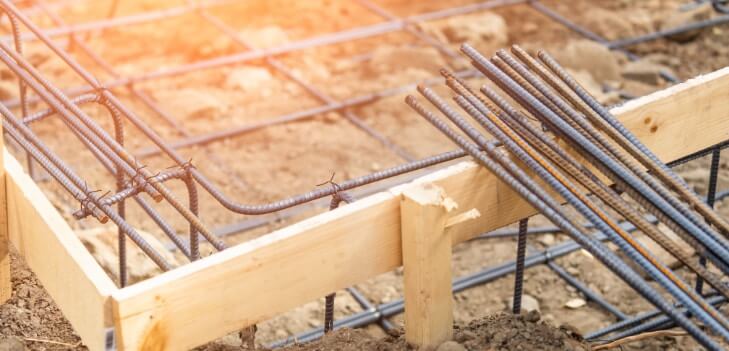The saying “bend but don’t break” is usually served to describe subpar defenses in a sports setting. However, with rebar, it is a way of life. Rebar is traditionally paired with structural concrete to reinforce the amount of stress and weight the concrete can withstand.
However, not one rebar fits all projects. There is a variety of rebar that each serve a specific purpose depending on the architect or engineer’s vision. From the material the rebar is made from to what the rebar is coated in to serve as a protectant from corrosion, here are five types of rebar used in construction.
5 Types of Rebar
1. Carbon Steel Rebars
Cost-effectiveness plus reliability gives you all you could want from this rebar. That is why carbon steel rebar is the most common type of utilized rebar. Its versatility makes it great for most jobs, however, it does not stand up well against moisture. It corrodes more easily than other types, making it risky in areas that are exposed to water frequently and high humidity.
2. Epoxy-Coated Rebars
Unlike carbon steel rebars, Epoxy-coated rebars are expensive, yet perfect for high moisture areas. This variety is utilized in areas that will be in contact with saltwater or where corrosion will be a future issue. The coating itself can be delicate so from point of purchase to transportation to installation, it should be handled with care to be able to do what it was made to do.
3. Galvanized Rebars
Sure, an epoxy coating may be preferred by some contractors, but there is no replacing the tried-and-true hot-dipped galvanized (HDG) rebars. They are 40 times more resistant to corrosion than carbon steel rebars as they are dipped in a zinc coating that prevents rusting. However, the main difference between HDG and epoxy coated rebar is that HDG offers a less delicate coating that is able for more wear and tear across shipping and installation.
4. Expanded Metal or Wire Mesh Rebars
You have your rounded rebar, and then you have expanded metal or wire mesh rebar. This style of reinforcement compliments concrete as much as the others, however ideally for lighter jobs. Expanded metal is commonly used where a considerable thickness of plaster is required, or to reinforce light concrete construction. If there’s a concrete job, there’s rebar for it.
5. Stainless Steel Rebars
Finally, while it is not as cheap as carbon steel, stainless steel rebar is a great alternative. Used most commonly expansion joints on projects such as bridges, roads, piers, and other structures that will bear substantial loads of weight multiplied by mass exposure to weathering. This may be the best of both worlds for projects that you want corrosion protection, but not break the bank.
Now, on your next concrete project, you have all these rebars at your disposal. Whether it’s the cheap, but reliable carbon steel rebar or the expensive, but long-lasting galvanized rebar, you’re ready for a secure structure!
Visit Tampa Steel & Supply for Rebar
Are you in need of steel supplies? Look no further than the professionals at Tampa Steel and Supply. We stock an extensive list of steel products for whatever project you need to tackle. We’re proud to have served our customers for nearly four decades and are ready to assist you with your steel needs. Have questions? Give us a call today to learn more, or stop by our beautiful Tampa showroom.
Request a Quote Online
Or Call Tampa Steel & Supply at (813) 241-2801

